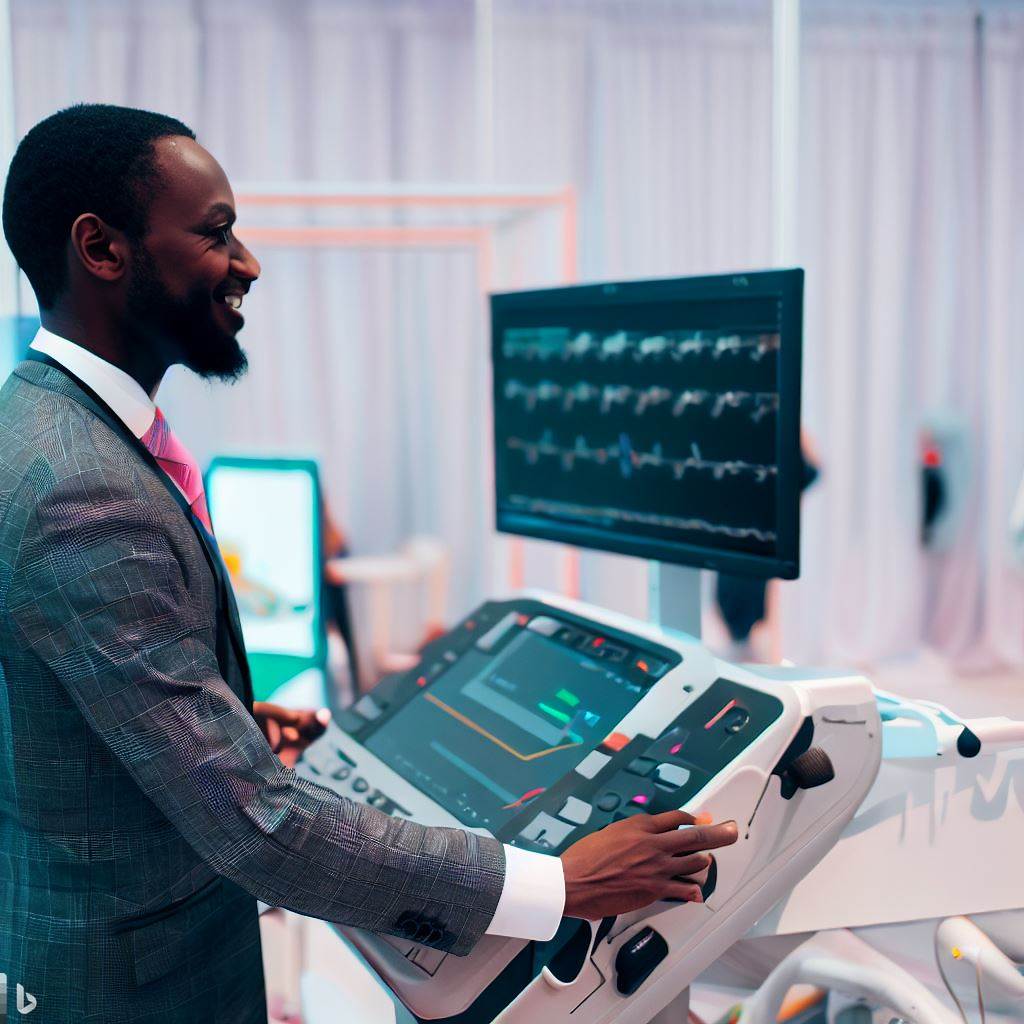Introduction
Diagnostic medical sonography is a non-invasive imaging technique that uses sound waves to produce pictures of the inside of the body.
Diagnostic medical sonography plays a crucial role in healthcare by providing accurate and real-time visualization of organs.
Brief explanation of diagnostic medical sonography
In this blog post, we will explore the future of diagnostic medical sonography in Nigeria, focusing on its potential to revolutionize healthcare in the country.
Diagnostic medical sonography, also known as ultrasound, is a non-invasive imaging technique that utilizes high-frequency sound waves to generate precise images of the inside of the body.
It has become an essential tool in modern medicine, aiding in the diagnosis and monitoring of various medical conditions.
Importance of diagnostic medical sonography in healthcare
The importance of diagnostic medical sonography in healthcare cannot be overstated.
It provides valuable information about the structure and function of organs, enabling healthcare professionals to detect abnormalities, evaluate organ health, and guide treatment decisions.
This imaging technique is particularly beneficial in obstetrics, cardiology, and radiology.
Nigeria, being a populous country with a high disease burden, can greatly benefit from the advancement of diagnostic medical sonography.
With improved access to diagnostic ultrasound, healthcare providers can enhance the accuracy and efficiency of diagnoses, resulting in better patient outcomes.
Moreover, the future of diagnostic medical sonography in Nigeria holds the potential for increased specialization and advanced applications.
With continuous advancements in technology, sonographers can expect improved image quality, enhanced portability, and expanded capabilities in areas such as 3D and 4D imaging.
Essentially, diagnostic medical sonography is an invaluable tool in healthcare that is rapidly evolving.
Its future in Nigeria looks promising, with the potential to transform healthcare delivery and contribute to improved patient care.
Current State of Diagnostic Medical Sonography in Nigeria
Overview of the current situation
Diagnostic medical sonography, also known as ultrasound imaging, is an essential tool in healthcare. In Nigeria, the practice of diagnostic medical sonography is gradually gaining recognition as a vital aspect of medical care.
Availability and accessibility of diagnostic medical sonography
- The availability of diagnostic medical sonography services in Nigeria is limited, primarily due to a lack of infrastructure and trained professionals.
- Major cities and urban centers offer better access to diagnostic medical sonography services compared to rural areas, which face more significant challenges in terms of availability.
- Public healthcare facilities often lack the necessary equipment and resources to provide high-quality diagnostic medical sonography services.
- Private clinics and hospitals, on the other hand, are more likely to have advanced ultrasound machines and well-trained sonographers.
Challenges faced by professionals in the field
- A shortage of trained sonographers is one of the significant challenges in the field of diagnostic medical sonography in Nigeria.
- Limited educational institutions offering accredited programs in sonography contribute to the shortage of professionals.
- The cost of equipment and maintenance, as well as the constantly evolving technology, present financial challenges for professionals and healthcare facilities.
- The lack of standardized regulation and certification processes for sonographers leads to inconsistencies in the quality of services provided.
Importance of addressing these issues for improved healthcare
Addressing the challenges faced by diagnostic medical sonography professionals in Nigeria is crucial for several reasons:
- Improved access to diagnostic medical sonography services will lead to earlier detection and diagnosis of diseases, ultimately improving patient outcomes.
- Having a well-trained and sufficient workforce of sonographers will ensure the availability of quality healthcare services across the country.
- Establishing standardized regulations and certification processes will enhance the credibility and professionalism of the field.
- Investing in infrastructure and technology will enable healthcare facilities to offer advanced diagnostic imaging services to the population.
- Enhanced collaboration between educational institutions, professional bodies, and healthcare facilities will facilitate the training and professional development of sonographers.
- Addressing these issues will contribute to the overall improvement of healthcare in Nigeria, reducing the burden on patients and optimizing healthcare resources.
Read: Step-by-step Guide to Becoming a Nursing Assistant in Nigeria
Advancements and Innovations in Diagnostic Medical Sonography
Overview of recent advancements in the field worldwide:
- Improved image resolution and quality in ultrasound scans.
- Development of 3D and 4D ultrasound technology.
- Integration of artificial intelligence (AI) algorithms for image analysis.
- Introduction of handheld and portable ultrasound devices for point-of-care diagnostics.
- Advancements in elastography, allowing for better tissue characterization.
- Enhanced Doppler techniques for improved blood flow visualization.
Introduction of new technologies and ultrasound equipment:
- Introduction of advanced ultrasound machines with higher frequency transducers.
- Implementation of wireless and cloud-based data transfer in ultrasound imaging.
- Use of contrast agents to improve the visualization of specific organs and tissues.
- Integration of ultrasound with other imaging modalities like MRI and CT scan.
- Development of telemedicine capabilities in ultrasound for remote diagnosis and consultation.
Potential benefits and impact of new advancements in Nigeria:
- Improved accuracy in diagnosis leading to better patient outcomes and reduced mortality rates.
- Faster and more efficient diagnostic process, reducing waiting times for patients.
- Increased accessibility to diagnostic medical sonography in remote areas through portable devices.
- Better detection and monitoring of fetal abnormalities, improving prenatal care.
- Enhanced training opportunities for sonographers to keep up with new technologies.
- Cost-effectiveness through the utilization of AI algorithms for image analysis.
Growing Demand for Diagnostic Medical Sonography in Nigeria
Recognizing the increasing demand for medical imaging services:
- Healthcare facilities in Nigeria are experiencing a surge in patients requiring diagnostic imaging.
- The need for accurate and timely diagnosis is crucial for effective patient management.
- Diagnostic medical sonography has emerged as a valuable tool in meeting this growing demand.
- The availability of ultrasound machines and skilled sonographers has expanded in recent years.
- Patients and healthcare providers are now aware of the benefits and accessibility of sonography.
- People in remote areas, who previously lacked access to imaging services, can now benefit from sonography.
Contributions of diagnostic medical sonography to early detection and diagnosis:
- Diagnostic medical sonography allows for non-invasive imaging of various body parts, aiding in early detection.
- It can detect abnormalities, such as tumors or cysts, in organs like the liver, kidneys, and reproductive system.
- Obstetric sonography enables monitoring and assessing fetal development during pregnancy.
- Early detection of fetal anomalies can help in planning appropriate medical interventions.
- Doctors can use sonography to guide biopsies and injections, enhancing accuracy and reducing risks.
- Cardiac sonography plays a vital role in diagnosing heart conditions and evaluating cardiac function.
Potential career opportunities and job market:
- The growing demand for diagnostic medical sonography has resulted in a surge in job opportunities.
- Skilled sonographers are in high demand in various healthcare settings, including hospitals, clinics, and diagnostic centers.
- Diagnostic medical sonographers can specialize in areas like abdominal, obstetric, or cardiac sonography.
- They can also work as educators, trainers, or consultants in the field of medical sonography.
- The job market for sonographers is expected to continue expanding in Nigeria and globally.
- Advancements in technology and increasing recognition of sonography’s importance further contribute to career prospects.
Ultimately, the demand for diagnostic medical sonography in Nigeria is growing rapidly due to increasing awareness and the need for accurate and timely diagnoses.
Sonography plays a crucial role in early detection and diagnosis, leading to improved patient outcomes. This demand has resulted in numerous career opportunities and a positive job market for skilled sonographers in Nigeria.
As the field continues to advance, the future of diagnostic medical sonography looks promising both in Nigeria and worldwide.
Read: Training and Education for Lab Techs in Nigeria

Importance of Education and Training in Diagnostic Medical Sonography
Need for accredited educational programs and institutions
- Educational programs and institutions in diagnostic medical sonography should be accredited to ensure a high standard of education.
- Accreditation ensures that the program meets certain quality standards and prepares students effectively.
- Accredited programs have a curriculum that is reviewed periodically to keep up with advancements in sonography.
- Graduating from an accredited program gives students a competitive edge in the job market.
- Employers prefer hiring graduates from accredited programs as they are deemed to be more competent.
Development of a standardized curriculum
- A standardized curriculum provides a consistent learning experience for students across different educational institutions.
- This ensures that all graduates have similar knowledge and skills in diagnostic medical sonography.
- It helps establish a baseline for assessing the competency of graduates in their profession.
- A standardized curriculum covers essential topics and skills required in the field.
- It helps students gain a comprehensive understanding of diagnostic medical sonography practices.
Training and certification requirements for sonographers
- Sonographers must undergo extensive training and meet specific certification requirements.
- Training programs equip sonographers with the necessary skills to perform ultrasound procedures accurately.
- Certification ensures that sonographers have met the minimum competency standards set by professional bodies.
- Training and certification validate the knowledge and skills of sonographers, ensuring quality patient care.
- Continuing education is also essential to stay updated with advancements in sonography technology and practices.
Read: Top Institutions to Study Phlebotomy in Nigeria
Role of professional organizations and associations in promoting quality education and training
- Professional organizations and associations play a crucial role in advancing education and training in diagnostic medical sonography.
- They establish guidelines and standards for the education and practice of sonography.
- They collaborate with educational institutions to develop accredited programs and curricula.
- These organizations also offer resources, workshops, and conferences to support ongoing professional development.
- They advocate for higher educational standards and promote the importance of continuous learning in the field.
In fact, education and training are vital in the field of diagnostic medical sonography.
Accredited programs and institutions, standardized curricula, certification requirements, and the support of professional organizations all contribute to the quality and competency of sonographers.
By prioritizing education and training, Nigeria can ensure that diagnostic medical sonography keeps pace with advancements and provides the best possible care to patients.
Read: Nigeria’s Top Schools for Aspiring Lab Technicians
Government Support and Policies for Diagnostic Medical Sonography
Analysis of current government initiatives promoting healthcare advancements
- The Nigerian government has launched various initiatives to promote advancements in healthcare.
- These initiatives aim to improve the quality and accessibility of diagnostic medical sonography services.
- One such initiative is the establishment of diagnostic medical sonography training programs in public institutions.
- These programs provide specialized training to individuals interested in pursuing a career in sonography.
- Additionally, the government has allocated funds for the procurement of modern sonography equipment.
- This ensures that healthcare facilities are equipped with the necessary tools to provide accurate diagnoses.
Importance of government support for the growth of diagnostic medical sonography
- Government support plays a crucial role in the growth and development of diagnostic medical sonography.
- Firstly, it helps in increasing the number of skilled sonographers in the country.
- By providing funding for training programs, the government can address the shortage of qualified professionals.
- Moreover, government support ensures that healthcare facilities have access to state-of-the-art equipment.
- This enhances the accuracy and precision of diagnostic imaging, leading to better patient outcomes.
- Furthermore, government involvement encourages research and development in the field of sonography.
Recommendations for further government involvement and policies
- To further enhance government support for diagnostic medical sonography, a multi-faceted approach is needed.
- Firstly, the government should allocate additional funds to expand existing training programs and establish new ones.
- This will help meet the growing demand for skilled sonographers in the healthcare sector.
- Secondly, the government should collaborate with private institutions to establish public-private partnerships.
- These partnerships can facilitate the sharing of expertise and resources to enhance the quality of sonography services.
- Additionally, the government should provide incentives and scholarships to encourage students to pursue a career in sonography.
- By offering financial support, more individuals will be motivated to enter the field, addressing the shortage of skilled professionals.
- Furthermore, the government should establish regulations and standards for diagnostic medical sonography practices.
- This will ensure that all healthcare facilities adhere to best practices, promoting patient safety and quality care.
- Lastly, the government should prioritize research and development in sonography.
- By providing grants and funding for research projects, innovation and advancements in diagnostic imaging can be achieved.
In review, government support and policies play a vital role in the future of diagnostic medical sonography in Nigeria.
Through initiatives, funding, and partnerships, the government can address the shortage of skilled professionals, enhance the quality of sonography services, and promote research and development in the field.
Continued government involvement is crucial to ensure the growth and success of diagnostic medical sonography in Nigeria.
Read: Current Trends in Nigeria’s Clinical Lab Tech Field
Collaboration and Awareness Campaigns for Diagnostic Medical Sonography
Importance of collaboration between healthcare stakeholders and professionals
Collaboration between healthcare stakeholders and professionals is crucial for the future of diagnostic medical sonography in Nigeria.
Working together, healthcare providers, educators, and policymakers can develop a comprehensive strategy to enhance the field.
Collaboration allows for the sharing of expertise, knowledge, and resources, ultimately leading to improved patient care.
By bringing together different perspectives and skill sets, stakeholders can tackle complex challenges and identify innovative solutions.
Moreover, collaboration fosters a sense of unity and cohesion within the healthcare community.
Through joint efforts, stakeholders can create a supportive environment that nurtures the growth and advancement of diagnostic medical sonography.
Promoting public awareness about the benefits of diagnostic medical sonography
Public awareness plays a vital role in shaping the future of diagnostic medical sonography in Nigeria.
It is crucial to educate the public about the benefits and potential of this field, to dispel misconceptions, and to encourage early detection and timely treatment.
By raising public awareness, individuals can better understand the role of sonographers and the impact of their work on patient outcomes.
They can recognize the significance of diagnostic medical sonography in detecting and diagnosing various medical conditions, including heart diseases, cancers, and fetal abnormalities.
Through educational campaigns, workshops, and community outreach programs, the public can become informed advocates for diagnostic medical sonography.
This increased awareness can drive the demand for well-trained professionals and improved access to sonography services across the country.
Read: The Path to Becoming a Surgeon in Nigeria
Advocacy for government and private sector support in creating awareness campaigns
To effectively promote public awareness, it is essential to advocate for the support of both the government and the private sector.
Their involvement can significantly amplify awareness campaigns and lead to sustainable advancements in diagnostic medical sonography.
Government support can be instrumental in creating policies that prioritize the development and integration of sonography services into the broader healthcare system.
This includes allocating funding for training programs, establishing accreditation standards, and implementing regulations to ensure quality and safety.
Private sector collaboration, on the other hand, can provide valuable financial and technical resources to support awareness campaigns.
By partnering with private healthcare institutions, equipment manufacturers, and industry associations, stakeholders can reach a wider audience and optimize the impact of their initiatives.
Collectively, collaboration and awareness campaigns have the potential to transform the landscape of diagnostic medical sonography in Nigeria.
By fostering collaboration, promoting public awareness, and advocating for support, stakeholders can pave the way for a future where diagnostic medical sonography is fully embraced and integrated into the healthcare system, leading to improved patient outcomes and overall healthcare quality.
Read: Challenges Faced by Clinical Lab Technicians in Nigeria
Gain More Insights: Gender Gap in Nigeria’s Surgical Technologist Field
Conclusion
This blog post has discussed the future of diagnostic medical sonography in Nigeria.
It has highlighted key points such as the increasing demand for sonographers and the potential for technological advancements in the field.
Moving forward, it is imperative for stakeholders in the healthcare sector to invest in the development and growth of diagnostic medical sonography in Nigeria.
This will require collaboration between government agencies, educational institutions, and healthcare facilities.
By investing in training programs, research, and infrastructure, Nigeria can harness the full potential of diagnostic medical sonography.
This will improve healthcare outcomes, enhance patient care, and contribute to the overall development of the country’s healthcare system.
Lastly, the future of diagnostic medical sonography in Nigeria is promising.
With the right investments and support from stakeholders, this field can make a significant impact on healthcare delivery in the country.
It is a call to action for all involved to prioritize and invest in the development and growth of diagnostic medical sonography in Nigeria.




